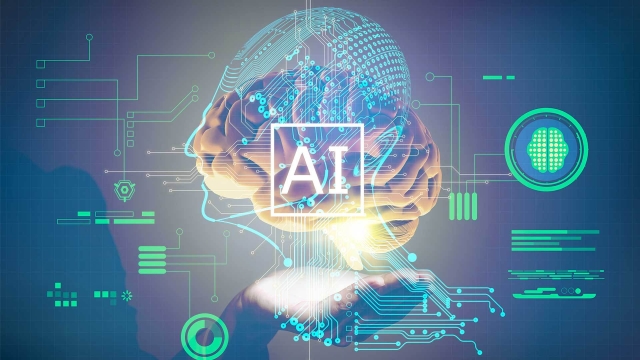The Rise of Intelligent Machines: Unveiling the Future of Artificial Intelligence

Artificial intelligence, a term that once belonged solely in the realm of science fiction, has rapidly evolved to become a central part of our present reality. In recent years, the rise of intelligent machines has captivated the world, as the boundaries between human ingenuity and machine capabilities blur. The very notion of what it means to be intelligent is being reshaped as machines now possess the ability to learn, reason, and even make decisions like never before.
At its core, artificial intelligence refers to the development of computer systems that can perform tasks that usually require human intelligence. From autonomous vehicles and virtual assistants to facial recognition technology and advanced data analytics, AI has penetrated almost every facet of our lives. Its impact is not limited to industry sectors like healthcare, finance, and transportation, but extends to entertainment, education, and even our daily interactions.
The progress of artificial intelligence has been fueled by a multitude of factors, most notably the exponential growth of computing power and the vast amounts of data available for analysis. Machine learning, a technique that enables computers to learn from and make predictions or decisions based on patterns in data, has become a foundational pillar of AI. Coupled with advancements in algorithms, AI models have become increasingly accurate, enabling machines to unlock complex solutions, optimize processes, and enhance productivity in remarkable ways. The future of AI promises further breakthroughs, with advancements in areas such as reinforcement learning, natural language processing, and computer vision paving the way for even greater possibilities.
However, as AI continues to push the boundaries of what machines can achieve, a myriad of ethical and societal considerations arise. Questions surrounding privacy, bias, and the potential displacement of human workers must be addressed to ensure that AI technologies are implemented responsibly and for the benefit of all. The collaboration between humans and machines, rather than one replacing the other, holds the key to harnessing the true power of artificial intelligence while safeguarding the fundamental values and principles that define us as a society.
In this era of rapid technological progression, it is imperative that we understand the implications, societal impact, and potential pitfalls of artificial intelligence. As intelligent machines become an integral part of our lives and shape the future in ways we may not yet comprehend, this article delves into the fascinating world of AI, exploring its origins, current applications, and the exciting prospects that lie ahead. Through this exploration, we hope to unravel the enigma of artificial intelligence, ultimately shedding light on its transformative force and unveiling the limitless possibilities it holds for our future.
Understanding Artificial Intelligence
Artificial intelligence (AI) refers to the simulation of human intelligence in machines that are programmed to think and learn like humans. It involves the development of computer systems and algorithms that are capable of performing tasks that typically require human intelligence. AI enables machines to understand natural language, recognize patterns, analyze data, and make decisions based on the information at hand.
One of the key aspects of artificial intelligence is machine learning. Through machine learning, AI systems can analyze vast amounts of data, identify patterns, and learn from the information provided. This enables them to improve their performance and accuracy over time. Machine learning algorithms are designed to adapt and evolve, allowing AI systems to solve complex problems and provide valuable insights.
Artificial intelligence has the potential to revolutionize various industries and sectors. From healthcare and finance to manufacturing and transportation, AI technologies are being used to automate processes, enhance productivity, and make informed decisions. With AI, machines can process data at incredible speeds and identify trends or anomalies that might go unnoticed by humans. This has the power to greatly improve efficiency and offer significant benefits.
As AI continues to advance, there are both excitement and concerns about its potential impact on society. Questions arise regarding ethics, privacy, and the implications of autonomous systems. It is crucial to ensure that AI is developed and deployed responsibly, with transparent guidelines and regulations in place to address any potential risks.
Artificial intelligence is a rapidly growing field that holds great promise for the future. As we delve deeper into understanding AI, we uncover its immense potential to transform industries, improve decision-making processes, and shape the way we interact with technology. With continued research and development, the future of artificial intelligence looks promising, offering exciting possibilities for innovation and advancement.
Applications of AI in Various Industries
AI has made significant strides in recent years, transforming various industries and revolutionizing the way we work. From healthcare to finance, transportation to retail, artificial intelligence is being harnessed to enhance processes, improve efficiencies, and drive innovation.
-
Healthcare:
AI is transforming the healthcare industry by improving diagnostics, treatment plans, and patient care. Machine learning algorithms are being trained on vast amounts of medical data to identify patterns and make accurate predictions, aiding doctors in diagnosing diseases and recommending personalized treatment options. Additionally, AI-powered robots are assisting in surgeries, allowing for precision and minimizing human errors. -
Finance:
The financial sector has also witnessed the transformative power of AI. Intelligent algorithms are being used to analyze market trends, make predictions, and automate trading processes. AI-powered chatbots are being employed by banks to provide customer support, answer queries, and offer personalized financial advice. Moreover, advanced fraud detection systems powered by AI are helping to prevent financial crimes and protect sensitive information. -
Transportation:
AI is reshaping the transportation industry, making it more efficient, safe, and environmentally friendly. Self-driving cars, powered by AI technology, are being developed to reduce accidents and traffic congestion. AI algorithms are also optimizing routes for delivery services, reducing fuel consumption and minimizing the carbon footprint. Additionally, AI is being used to enhance public transportation services by improving scheduling, optimizing traffic flow, and predicting maintenance needs.
As AI continues to advance, its potential across industries is endless. From agriculture to manufacturing, entertainment to education, the applications of artificial intelligence are shaping a new era of innovation and automation.
Ethical Considerations and Future Implications
In today’s rapidly advancing world, the field of artificial intelligence is gaining significant momentum. As we witness the rise of intelligent machines, it becomes crucial to examine the ethical considerations that accompany this progress and the future implications it holds.
First and foremost, the development of artificial intelligence brings forth questions surrounding privacy and data protection. As AI becomes more prominent in our daily lives, it accumulates vast amounts of personal information. How this data is collected, stored, and utilized must be guided by robust ethical frameworks to ensure the protection of individuals’ privacy rights and prevent any misuse or abuse. Striking the delicate balance between innovation and safeguarding privacy will be a paramount challenge moving forward.
Secondly, as intelligent machines become more autonomous and capable of making decisions, the issue of accountability arises. When accidents or mistakes occur, whether in self-driving cars or automated financial systems, it becomes crucial to identify who bears the responsibility. Establishing legal and ethical guidelines for holding AI systems accountable for their actions is crucial to ensuring transparency, fairness, and justice in these situations.
Additionally, the rise of AI raises concerns about the potential impact on employment. As AI technology progresses, it has the potential to automate various tasks and industries, which might lead to job displacement for certain professions. As a society, we must anticipate these disruptions and focus on creating strategies to reskill and upskill the workforce to adapt to the changing job landscape. By doing so, we can ensure that the benefits of artificial intelligence are distributed equitably and no one is left behind.
As we journey into the future of artificial intelligence, it is vital to confront these ethical considerations head-on. By addressing issues related to privacy, accountability, and workforce displacement, we can create an environment that fosters responsible AI development and harnesses the full potential of intelligent machines for the betterment of society. Only by taking these crucial steps can we truly unveil the promising future that artificial intelligence holds.


